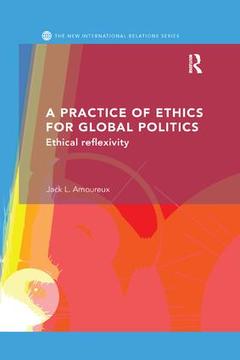Description
A Practice of Ethics for Global Politics
Ethical Reflexivity
New International Relations Series
Language: English
Subject for A Practice of Ethics for Global Politics:
Keywords
Ethical Reflexivity; ethical; Young Man; reflexivity; Pop Stars; NATO Official; Agency Structure Analysis; JDAM; Joint Direct Attack Munitions; NATO Troop; International Humanitarian Law; ICRC Delegation; Kigali Genocide Memorial; ICRC Principle; ICRC Staff; ICRC Report; Drone Strikes; Drone Policy; Enhanced Interrogation; Drone Program; Drone Practices; Judicious Study; Eliminating Al Qaeda; Drone Victims; IR Scholar; Sere Training; Enlarged Mentality
Publication date: 06-2017
· 15.6x23.4 cm · Paperback
Publication date: 10-2015
· 15.6x23.4 cm · Hardback
Description
/li>Contents
/li>Readership
/li>Biography
/li>
What kind of ethics in world politics is possible if there is no foundation for moral knowledge or global reality is at least complex and contingent? Furthermore, how can an ethics grapple with difference, a persistent and confounding feature for global politics? This book responds to the call for a bold and creative approach to ethics that avoids assuming or aspiring to universality, and instead prioritizes difference, complexity and uncertainty by turning to reflexivity, not as method or methodology, but as a practice of ethics for politics.
This practice, ?ethical reflexivity?, offers individuals, organizations and communities tools to recognize, interrogate and potentially change the stories they tell about politics?about constraints, notions of responsibility and visions of desirability. The benefits and limits of ethical reflexivity are investigated by the author, who engages writing on critique, rhetoric, affect and relationality, and carefully considers dominant and alternative framings of difficult issues in International Relations (IR)?the 1994 genocide in Rwanda, and the US policies of ?enhanced interrogation? and drone strikes. This path-breaking study provokes new possibilities for agency and action and contributes to a growing literature in IR on reflexivity by uniquely elaborating its promise as an ethics for politics, and by drawing on thinkers less utilized in discussions of reflexivity such as Hannah Arendt, Michel Foucault and Aristotle.
This book will appeal to scholars and upper-level graduates in several sub-fields of IR, including international/global ethics, IR theory, global governance, international organizations, non-governmental organizations, foreign policy analysis and US foreign policy.
Acknowledgements. Introduction To ‘Work on our Limits’ through ‘Permanent Critique’ 1 Aristotelian Reflexivity 2 Giddens’ Reflexive Modernity, Arendt’s Inner Dialogue, and Foucault’s ‘Critical Ontology’ of Ourselves 3 The Global Phronimos 4 Living in and beyond Genocide in Rwanda 5 ‘An Ethical Train Wreck’? Enhanced Interrogation in the U.S. War on Terror 6 The Silences of Private Judgment: Drone Practices, Criticism at Home and Abroad, and the Failure to Respond. Some Closing Thoughts on Behalf of Authorial Reflexivity. Index
Jack L Amoureux is a Teacher-Scholar Postdoctoral Fellow at Wake Forest University in Winston-Salem, North Carolina. He previously taught at American University in Washington, DC.




